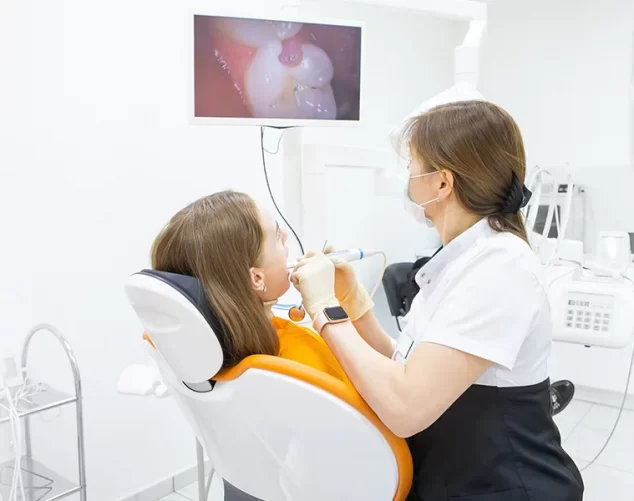What is Endodontic Surgery and When is it Needed?

What Is Endodontic Surgery?
It is also known as an Apicoectomy, apical surgery, or root-end surgery. It is a dental procedure that involves surgically removing infected or damaged tissues in the root of a tooth. This type of surgery is recommended when a traditional root canal treatment has failed or is not possible due to the complex anatomy of the tooth.
What Does the Surgery Entail?
During endodontic surgery near you, the endodontist will make a small incision in the gum tissue near the affected tooth to access the root. The endodontist in Tarzana will then remove the damaged or infected tissue, clean and shape the root canal system, and place a small filling to seal the end of the root. The final step entails closing the incision with stitches so you can begin post-operative care.
Is It Painful?
Generally, any dental surgery will cause discomfort and pain. The same applies to this type of surgery. Fortunately, during your treatment, you will not experience any pain. Dentists typically employ sedation dentistry and local anesthesia to numb your mouth and keep you relaxed and calm during the surgery. If anything, most patients can resume normal activities within a few days following the procedure.
When Do You Need Endodontic Surgery?
Often, dentists perform endodontic surgeries for diseased tooth roots or when a root canal treatment is unsuccessful or not possible due to certain factors. Some situations that may necessitate endodontic surgery are:
-
Persistent pain in a tooth that has already undergone a root canal procedure – could indicate that there is still an infection or inflammation in the tooth root that requires surgical intervention.
-
Recurrent infection after root canal treatment – may point to an underlying infection that needs surgery to remove its source.
-
Damaged tooth roots due to injury or decay – endodontic surgery removes the damaged tissue and restores the health of the tooth.
-
A blocked canal that may make a root canal not possible – an endodontic surgery in Tarzana can help remove the blockage and allow for proper treatment of the root.
-
A fractured tooth that extends into the root – surgery may be necessary to remove the damaged portion of the root and restore the tooth.
-
Abscessed tooth at the gum line – features a picker filled with pus and other fluids. An endodontist near you performs an Apicoectomy to treat such a tooth.
What Happens After Endodontic Surgery Near You?
Usually, before you leave our dental offices at LA Endodontics, we provide post-operative care instructions for managing your oral health after endodontic surgery. These are important to optimize your productivity and functionality during recovery. Some of the instructions include:
-
Avoid eating or drinking for at least 2 hours after the surgery. The goal is to allow the anesthesia to wear off to avoid accidents.
-
Avoid smoking or using tobacco products, as they can slow healing. Give it at least a week or two before you can start smoking again. Better yet, give up this habit that significantly compromises oral and body health.
-
Take prescribed medications as directed by your endodontist, including painkillers and antibiotics, to prevent infection and alleviate pain and swelling.
-
Apply ice packs to the affected area for the first 24 hours to reduce swelling.
-
Avoid brushing or flossing the surgical site for the first few days, but continue to brush and floss the rest of your teeth as usual.
-
Rinse your mouth gently with warm salt water a few times daily to promote healing and prevent infection on the wound.
-
Avoid strenuous physical activity or exercise, at least during the first 24 hours after the surgery.
-
Eat soft, bland, cold, or lukewarm foods for the first few days. Avoid crunchy or spicy foods that irritate the surgical site and worsen your pain, bleeding, and inflammation.
-
Attend all follow-up appointments with your endodontist in Tarzana, allowing them to monitor your healing progress and ensure the success of the surgery.
The last thing you need is an infection on the surgical site.